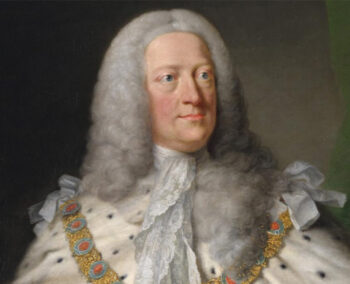Spirituality of Fasting

King George II (r. 1727-1760)

By Victor Parachin
In 1756 a frightened and somber King of England called for a day of solemn
prayer and fasting. Behind his call was the immediate threat of an invasion and war by the French. On February 6th, 1756 Reverend John Wesley recorded in his journal the positive effect a day of fasting and prayer had upon the nation: “The fast day was a glorious day, such as London has scarce seen . . . Every church in the city was more than full, and a solemn seriousness sat on every face. Surely God heareth prayer, and there will yet be a lengthening of our tranquility.” In a footnote he added: “Humility was turned into national rejoicing for the threatened invasion by the French was averted.”
In spite of the fact that the bible refers to fasting nearly one hundred times, it remains a discipline which is absent from the lives of many Christians. Yet, fasting is connected to people whose lives were filled with spiritual power and moral authority. Great religious leaders such as Moses, Elijah, Daniel, Jesus, Origen, Martin Luther, Francis of Assisi, Ignatius Loyola, Teresa of Avila, Jonathan Edwards and Charles Finney were known to fast, often for prolonged periods of time.
Although most Christians may not feel the need to do a lengthy fast, there are benefits to be gained from even a short period of self-denial. Here are a dozen spiritual benefits of fasting.
1. Fasting expands compassion. It's easy to talk about the problem of world hunger but the physical impact and emotional awareness is heightened when we do without food. “My sensitivity to the plight of the poor increased,” says one woman who fasted. “Eating only one meal a day made me tired and resentful and mine was a voluntary fast. What was it like for those who were lucky to get one meal a day? I couldn't be indifferent to their suffering once I'd shared it.”
2. Fasting is a way of preparing to meet a major challenge. People in the bible who faced great trials and troubles often dealt with them through prayer and fasting. Whenever special courage, insight, strength was needed, they turned to prayer combined with fasting. For example, before Queen Esther approached the king asking him to spare the Jews from destruction, she asked her people to spend three days in prayer and fasting. She felt that such a difficult enterprise needed prayers fortified by fasting if her effort was to be successful. “When this is done, I will go to the king, even though it is against the law. And if I perish, I perish,” she said. (Esther 4:16) Consequently, Esther approached the king with confidence and boldness, persuading him to reverse an edict which called for the annihilation of the Jews. A modern application would be to spend time in prayer and fasting whenever a personal or professional crisis looms.
3. Fasting is a way of following the example of Christ and the Apostles. Prior to his public ministry, Jesus spent forty days in prayer and fasting. (Matthew 4:1ff). Also, Jesus expected followers to fast. He said, “when you fast” not “if” you fast in Matthew 6:16.The missionary team of Paul and Barnabas are reported in scripture as fasting frequently before important decisions concerning the early church ministry. (Acts 13:2-3; Acts 14:23)
4. Fasting promotes spiritual growth. From the second through the fifth centuries, many important church leaders and mystics recommended fasting to deepen the spiritual life. Often they linked fasting to acts of kindness and love as an important spiritual discipline. Included in that group are: Clement of Rome, John Chrysostom, Peter Chrysologus, Jerome and Augustine. In fact, Augustine offered this spiritual advice: “Do you wish your prayer to fly toward God? Give it two wings: fasting and almsgiving.”
 5. Fasting is good for the soul. "Irrational feeding darkens the soul and makes it unfit for spiritual experiences," observed Thomas Aquinas. Those who fast report the practice leads to spiritual renewal, increased insight, deeper commitment, clarity of life purpose and greater intimacy with God.
5. Fasting is good for the soul. "Irrational feeding darkens the soul and makes it unfit for spiritual experiences," observed Thomas Aquinas. Those who fast report the practice leads to spiritual renewal, increased insight, deeper commitment, clarity of life purpose and greater intimacy with God.
Rabbi Joseph Telushkin, author of The Book Of Jewish Values, says that many Jewish people find the Yom Kippur (Day of Atonement) required fast ‘difficult’ claiming they’re so hungry they cannot focus on other activities. He offers this insight: “If the pangs of hunger can be so painful, then let something good emerge from them: Let them remind us that there are people who feel such hunger hundreds of days a year.”
6. Fasting is a reminder we do not live by 'bread alone'. Although food provides physical strength and energy for the body, the discipline of fasting provides the soul with stamina and vitality. In the New Testament Jesus quoted from Deuteronomy 8:3: “Man does not live by bread alone but on every word that comes from the mouth of the Lord.” (NIV). Behind that statement is the truth that people experience a hunger which cannot be filled merely by food and other material things. Ultimately, meaning, satisfaction and fulfilment in life result from a healthy relationship to God. Fasting is one way of nurturing that relationship.
7. Fasting is a positive response against materialism. “We are constantly bombarded by advertising telling us that we must have this or that to be healthy, happy, popular or wise,” says Allen S. Maller, Rabbi of Temple Akiba in Culver City, CO. “By fasting we assert that we need not be totally dependent on external things, even such essentials as food. If our most basic need for food and drink can be suspended for twenty-four hours, how much more our needs for all the nonessentials.” St. Francis de Sales offered similar advice when he recommended fasting: “If you are able to fast, you will do well to observe some days beyond what are ordered by the Church, for besides the ordinary effect of fasting in raising the mind, subduing the flesh, confirming goodness, and obtaining a heavenly reward, it is also a great matter to be able to control greediness, and to keep the sensual appetites and the whole body subject to the law of the Spirit.”
8. Fasting heightens gratitude. Often we take for granted the food which we consume daily. Skipping meals for a day or two will bring a strong reminder that our easy access to food should be a source of gratitude One man who fasted over a weekend broke his fast with a simple meal of soup. “After not eating for two days, the soup tasted unbelievably delicious. Every spoonful was like eating from an entire banquet. Prior to my fasting experience I would have merely eaten the soup without any awareness of it's flavour, texture or taste.” New Testament scholar William Barclay notes that fasting is effective in restoring basic pleasures and helping us appreciate the ordinary. “Nowadays the appetite is blunted; the palate is dulled, the edge is gone off it. What was once a sharp pleasure has become simply a drug which we cannot do without. Fasting keeps the thrill in pleasure by keeping pleasure always fresh and new.”
 9. Fasting strengthens virtues and weakens vices. “All great virtues bear the imprint of self-denial,” observed William Ellery Channing. Time in prayer combined with denial of food is effective in expanding the boundaries of the heart and soul. People who pray and fast regularly often experience greater compassion, kindness, sensitivity and love for others. They become less judgmental and more understanding. True humility is developed while false pride is reduced.
9. Fasting strengthens virtues and weakens vices. “All great virtues bear the imprint of self-denial,” observed William Ellery Channing. Time in prayer combined with denial of food is effective in expanding the boundaries of the heart and soul. People who pray and fast regularly often experience greater compassion, kindness, sensitivity and love for others. They become less judgmental and more understanding. True humility is developed while false pride is reduced.
10. Fasting builds self-discipline. Many people operate on the premise that a primary goal in life to always be happy and free of pain or discomfort. Our culture makes it easy for us to become extremely self-indulgent. We are in danger of becoming less resilient than our pioneer ancestors. Fasting is an effective antidote to the increasing 'softness' in life. A life which reaches out for every comfort and pleasure becomes weak, sluggish, flaccid and fragile. It is a life devoid of fulfilment and meaning. “No pain, no balm; no thorns, no throne; no gall, no glory; no cross, no crown,” noted William Penn.
11. Fasting can enlighten others. This use of fasting as a teaching tool and a moral imperative to change was exercised by Mahatma Gandhi. Early in the struggle against British Rule over India, Gandhi conducted a fast in prison for the violent excesses of his followers who did not practice his teaching of nonviolence against British authorities. Later, Gandhi fasted to persuade the government to remove discriminatory laws against people considered ‘untouchables’.
12. Fasting from food leads to other types of fasts. This was something noted and promoted by St. Ambrose (340-397) who said: “Do not limit the benefit of fasting merely to abstinence from food, for a true fast means refraining from evil. Loose every unjust bond, put away your resentment against your neighbour, forgive him his offences. Do not let your fasting lead to wrangling and strife. You do not eat meat, but you devour your brother; you abstain from wine, but not from insults. So all the labour of your fast is useless.”
 Entries(RSS)
Entries(RSS)